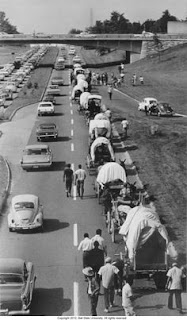Greater Things
Very truly I tell you, the one who believes in me will also do the works that I do, and in fact, will do greater works than these, because I am going to the Father. --John 14:12 Of all the things Jesus teaches, this may be one of the hardest teachings for us to receive as his disciples. How in the world can WE do what Jesus does? Not to mention "greater things?" Jesus heals the sick and the wounded and the traumatized. He lifts up and empowers those who have been crushed by the world's systems; the discarded, the forgotten. He stands with the scapegoated , the condemned, those being bullied. He removes labels and shame; he names people in new, life-giving ways. He overcomes the power of death to define life. He feeds the spiritually and physically hungry. He pitches his tent among the poor and inaugurates an order that puts them first. He forgives--removing obstacles, lifting burdens, loosing that which binds us...





